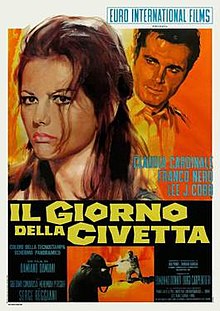The Day of the Owl (film)
| The Day of the Owl | |
|---|---|

Film poster
|
|
| Directed by | Damiano Damiani |
| Produced by | |
| Screenplay by |
|
| Based on |
The Day of the Owl by Leonardo Sciascia |
| Starring | |
| Music by | Giovanni Fusco |
| Cinematography | Tonino Delli Colli |
| Edited by | Nino Baragli |
|
Production
companies |
|
| Distributed by | Euro International Film |
|
Release date
|
|
|
Running time
|
108 minutes |
| Country |
|
| Box office | ₤1.335 billion |
The Day of the Owl (Italian: Il giorno della civetta) is a 1968 film directed by Damiano Damiani.
In 1967, director Elio Petri adapted Leonardo Sciascia's novel To Each His Own as We Still Kill the Old Way. The film was a box office hit in Italy, which led to producers Ermano Donati and Luigi Carpentieri to green-light the adaptation of another Sciascia novel they had purchased, The Day of the Owl. The script was developed by director Damiano Damiani and Ugo Pirro. Pirro had previously adapted To Each His Own for Petri's film. Damiani and Pirro created a radically different story from novel, with Pirro explaining that when writing "a script based on a novel, I usually don't respect the book's structure, To me, the book is a hint: I must try and preserve its message by using a different language." Pirro and Damiani retained the books famous line where the character of Don Mariano splits humanity into five category: "men, half-men, pigmies, arse-crawlers, and quackers."
The Day of the Owl was filmed at Incir - De Paolis in Rome and on location in Partinico, Sicily where Damiani shot most of the film. Assistant director Mino Giarda would state that during filming, the production received anonymous threatening letters when filming in Sicily. Giarda specifically noted that one day someone had fired bullets at a truck carrying the dailies. Girada stated that dialogue in the script that made reference to the complicity between Italy's largest political party and the mafia was the reasoning behind the shooting.
The Day of the Owl was released in Italy on 17 February 1968 where it was distributed by Euro International Films. On the films initial release, it was labelled as forbidden to minors by the Board of Censors who declared it was banned due to frequent use of profanity, its "harsh and corrosive criticism of institutions" and a lack of a happy ending. This rating was removed later when a few lines were re-dubbed. The film grossed a total of 1,335,244,000 Italian lire on its initial theatrical run. The film was later released in France in 1969 with a runtime of 100 minutes.
...
Wikipedia
